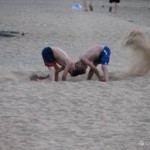I’ve never been able to endure even the idea of running on a treadmill, and only reluctantly do I join the walkers dutifully circling the track at local Chinese schools and universities. (My mind constantly runs in circles, so I don’t need cardiovascular reenactments.) Even plodding along familiar streets gets me restless, which partly explains why I love to run in new places. On a recent day in Suzhou, when my balky body had granted relatively enthusiastic permission for a run, I soured on what might have been a sweet outing, partly because my responsibilities as a friendly tourist nixed my locomotion. Walking (and stewing and brooding) burned a few calories, but I was glad to get out the next day.
We were, however, most favoured tourists. Our more-than-gracious hosts’ apartment was across the street from Central Park, quiet and leafy in the modern section of Suzhou, so my live-in travel agent and I laced up and lumbered. Ponds and stone avenues, lawns and impromptu dancersize groups of Chinese women gave way to streetcore tourism as my bride signalled she’d had enough. I went straight down Broadway – actually, it was called Xinggang Lu, which means “Denim is my Destination”* — toward the Pants. More respectfully known as the Gate of the Orient, this huge dual tower looks like a pair of low-rise jeans on a hipless Chinese girl. Central Park punctuates, for a few blocks, Xinggang Lu as its traffic flows toward and away from the TrouserGate, and it was only partly for the sake of avoiding getting lost that I went Pants-ward. Impertinence aside, it’s enormous and visually quite compelling, and I didn’t resist its bowlegged charms.
* It most certainly does not mean that.
The boulevard made for pleasant city running.

